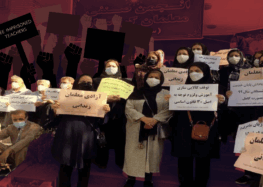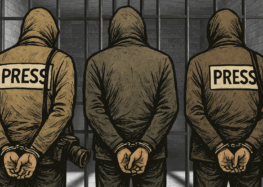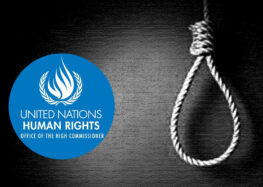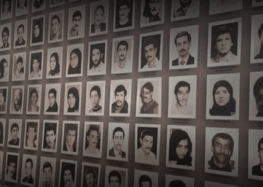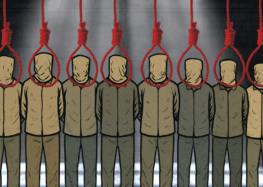Wave of Unlawful Arrests Targets Iran’s Minority Children
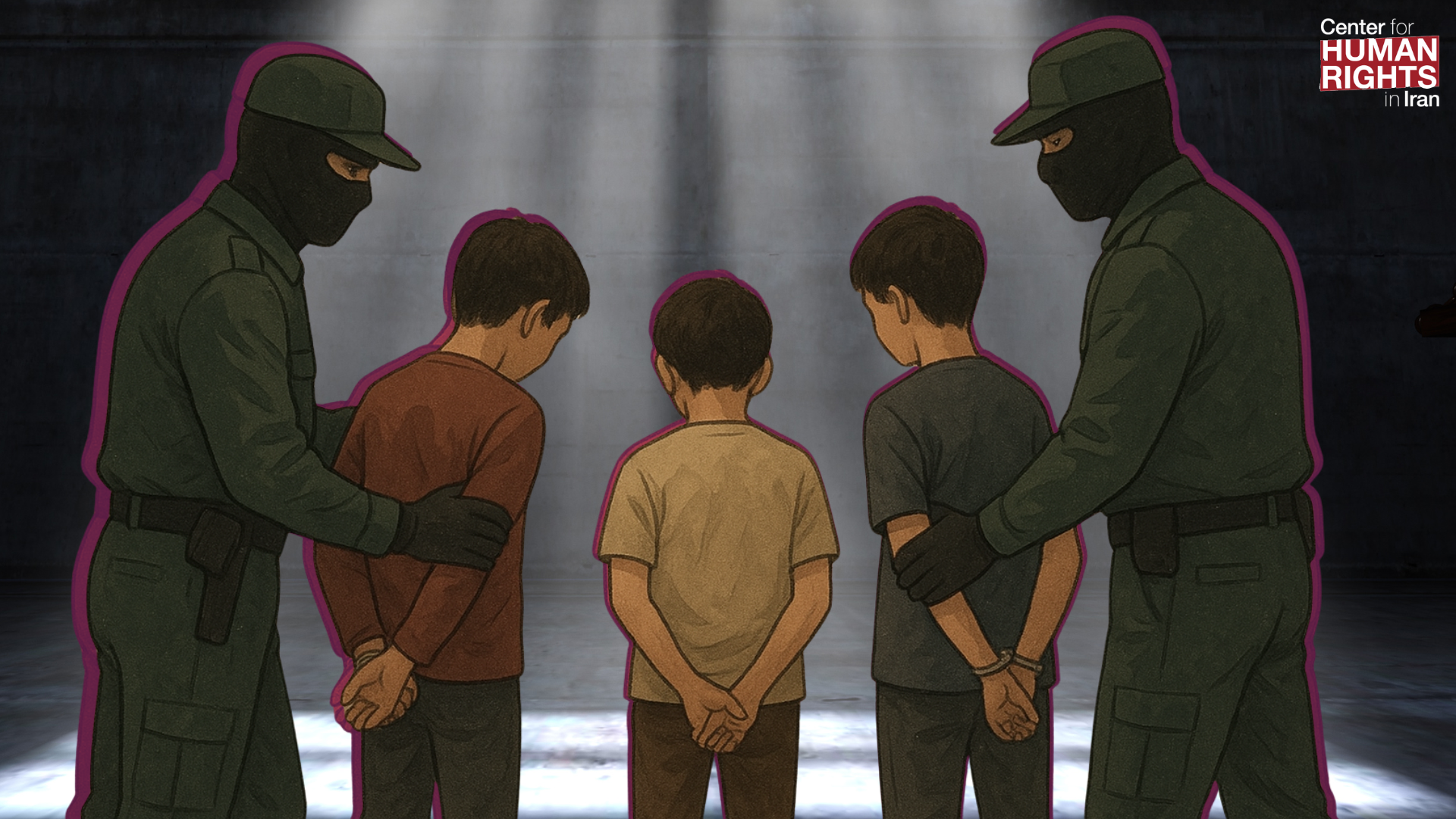
Children Held Incommunicado, Without Any Access to Families or Lawyers
“The number of children who have been arrested is higher than the cases reported.”
September 24, 2025 — The Islamic Republic is detaining a growing number of children under the guise of state security and holding them incommunicado, targeting minority populations in Kurdistan and Sistan and Baluchistan. In just the past 14 days, at least 11 children, some as young as 15, have been violently arrested by security forces without charge or legal justification and forcibly disappeared. The children have been denied any contact with their families.
Findings by the Center for Human Rights in Iran (CHRI) indicate that many of these arrests followed raids by security forces on the children’s homes or workplaces. There is no information regarding their current whereabouts, the reasons for their arrests, or their current legal status.
A source familiar with the arrests in Kurdish cities told CHRI:
“The most concerning issue is the families’ complete lack of information about where their children are being held. Many families do not even know which judicial or security authority they should approach to obtain information about their children’s cases.”
“Detaining children without charge, holding them incommunicado, and denying them access to their families and lawyers is not law enforcement. It is abduction,” said Bahar Ghandehari, CHRI’s Director of Advocacy.
“They are enforced disappearances under international law, and they must be treated as crimes that demand urgent global action and accountability,” Ghandehari said.
Key Findings:
- At least 11 children forcibly detained incommunicado since September 7
- No legal justification or charges provided at time of arrest
- Families remain uninformed of children’s whereabouts, in violation of international law
- Some of the detained children have pre-existing medical conditions and may be at serious health risk, especially given the risk of torture or ill-treatment in detention
- This pattern of abuse fits broader Islamic Republic strategies of repression against ethnic minorities, particularly around politically sensitive dates
This wave of enforced disappearances—many involving night-time home raids without warrants—marks an escalation in the Islamic Republic’s long campaign of repression against its ethnic minorities. CHRI warns that these arrests may represent only a fraction of the actual number of detained children, due to deliberate obfuscation by Iranian authorities.
CHRI calls on UN bodies, including the High Commissioner for Human Rights, the Human Rights Council, and the Special Rapporteurs on Iran and on minority issues, as well as governments worldwide, to:
- Publicly condemn the unlawful detention and disappearances of children in Iran;
- Demand the immediate disclosure of the names, locations, and status of all detainees;
- Demand the immediate release of all juveniles detained without due process;
- Insist all minors be held in juvenile facilities, separate from the adult prison population;
- Call for emergency investigations by relevant UN mandate holders and specialized bodies such as the HRC Fact-Finding Mission on Iran, and for a special session at the Human Rights Council to address Iran’s ongoing persecution of children and minorities;
- Refer Iran’s systematic abuses of children to the UN Committee on the Rights of the Child and its conduct to international mechanisms on enforced disappearances;
- Call upon UNICEF to urgently address these child arrests with the Iranian authorities;
- Impose targeted sanctions on all judicial and intelligence officials involved in the child detentions.
Children Targeted in Iran’s Kurdistan Province
The majority of the recent child arrests have taken place in Iran’s Kurdistan Province, where at least nine boys between the ages of 15 and 17 have been arbitrarily detained over the past two weeks.
Security forces—primarily agents of the Intelligence Ministry, which is under the authority of Iran’s President Masoud Pezeshkian—carried out coordinated raids on the children’s homes, often at dawn, without presenting judicial warrants or offering any explanation to the families. The children were subsequently transferred to unknown locations, with no official acknowledgment of their detention or communication with their parents.
The complete lack of transparency regarding these arrests has left the families in a state of fear and confusion. What is known about the arrests follows:
On September 7, 2025, security forces arrested Oraz Zamani, 15, and Behrouz Rashidi, 16, both from Kamyaran, and transferred them to an unknown location. Intelligence Ministry agents raided the children’s family homes in Kamyaran and arrested them without presenting a judicial warrant.
Soran Mozaffari and Payam Hosseini, both 17, from Kamyaran, were arrested on September 14, 2025, and taken to an undisclosed location. Mozaffari suffers from diabetes and requires insulin injections to manage his blood sugar.
Two 17-year-olds, Ehsan Sabouri and Kavan Sabouri, were arrested in Kamyaran on September 17, 2025. Their arrests took place at 5 a.m. at their home by security forces.
Two 16-year-olds, Diyar Gorgool and Alan Tabnak, were arrested in Oshnavieh and transferred to an unknown location. According to informed sources, at dawn on September 18, 2025, security forces raided their homes and arrested them without presenting a judicial warrant.
On September 19, 2025, security forces arrested two citizens in Oshnavieh, including a 16-year-old named Zaniar Shadikhah, and transferred them to an undisclosed location. Intelligence Ministry agents arrested him at his home without a judicial order.
Children Unlawfully Arrested in Sistan and Baluchistan
In Sistan and Baluchistan Province, similar patterns of arbitrary arrest have been reported. At least two minors—both 17 years old—have been detained by plainclothes security forces without judicial orders or formal charges. The arrests, carried out in broad daylight and often with violence, reflect an ongoing campaign of severe state repression against the Baluch ethnic minority.
As in Kurdistan, the families of the arrested children have been given no information about their sons’ whereabouts, condition, or legal status, further compounding their distress.
On September 10, 2025, security forces violently arrested Abdollah Azizi, a 17-year-old from Qasr-e Qand, and took him to an unknown location. According to the Rastak outlet, Azizi was violently arrested without a judicial warrant.
On September 9, 2025, Omar Safarzayi, a 17-year-old bakery worker in Zahedan, was arrested by plainclothes security forces without a judicial warrant or formal charges and transferred to an unknown location. According to Hal Vash, sources: “Around 2 p.m., plainclothes agents stormed the bakery, arrested Omar without charges or any legal authorization, and took him away.”
A source familiar with the detention of these children in Sistan and Baluchistan told CHRI:
“Most of the recent arrests are related to the upcoming anniversary of Zahedan’s Bloody Friday. [Bloody Friday refers to the massacre of over a hundred citizens by state security forces in Zahedan, Sistan and Baluchistan province, on September 30, 2022, during the Woman, Life, Freedom uprising that erupted across Iran in September 2022.]
“Government officials are worried that, given the dire economic situation and increasing public discontent, the anniversary of Zahedan’s Bloody Friday (on September 30) could become the scene of intense popular protests.
“After Israel’s attack on Iran, the situation in Sistan and Baluchistan became extremely securitized. Under the pretext of confronting armed groups, the authorities of the Islamic Republic have imposed a heavily militarized atmosphere on the cities of the province.
“There’s no doubt that the number of children under 18 who have been arrested in recent months is higher than the cases that have been publicly reported. A major and ongoing issue in Baluchistan has always been that news about arrests and other forms of repression and crackdowns against Baluch citizens receives far less media coverage than similar incidents affecting other ethnic and religious minorities.”
The source emphasized that the current arrests are not the only concern; previously arrested children in Baluchistan are still being held illegally in adult prisons and without clear legal status:
“Aside from the officially announced cases of child arrests, a number of children under the age of 18 who were arrested months ago are still being held in limbo in adult prisons.”
“These arrests are part of a systematic campaign of repression designed to instill fear and crush dissent in Iran’s most vulnerable communities,” Ghandehari said.
“Iran’s actions threaten to normalize the use of enforced disappearances and child detention as tools of political repression. The situation demands urgent international attention to protect detained children and prevent further arrests,” she added.
Iran is a Severe and Systematic Violator of Children’s Rights
The Islamic Republic is an international outlier regarding its treatment of children in numerous areas; it violently and profoundly violates the rights of children, in both law and practice—and ignores international laws, standards and norms—including binding international treaties and covenants it has signed—regarding protections and obligations required toward children.
In addition to the arbitrary and often incommunicado detention of children—especially in minority-populated provinces—the Islamic Republic:
- Executes juvenile offenders, despite the absolute international prohibition. Indeed, it is the world’s leading executioner of children and one of only very few countries in the world that continues to carry out juvenile executions.
- Tortures juveniles in state custody, including both physical and sexual abuse. During the Woman Life Freedom protests for example, which erupted across Iran in 2022, there were numerous documented reports and UN confirmation of repeated torture and sexual abuse of children, and hundreds of school children were arrested across the country for their peaceful participation in the movement.
- Uses excessive, unlawful, and lethal force against children, especially in minority regions. The Iranian government’s violent assaults on peaceful street gatherings and its lethal attacks on cross-border couriers, many of whom are children—all particularly targeting Kurdish and Baluch communities—violate the UN Basic Principles on the Use of Force and Firearms by Law Enforcement Officials, which allow lethal force only when strictly unavoidable to protect life.
The Islamic Republic’s Criminal Code disregards the international requirement to treat anyone under 18 as a child; it holds that the age of criminal responsibility for girls is nine years of age, and for boys it is fifteen years. It is in profound violation of Iran’s obligations under the Convention on the Rights of the Child (CRC), which it ratified, although it reserved the right to disregard any provision that it felt did not conform (in the Islamic Republic’s view) to Islamic law. The Islamic Republic ignores, with impunity, the treaty’s absolute prohibitions on the arbitrary detention, torture, and executions of juveniles.
These arrests also flagrantly violate the International Convention for the Protection of All Persons from Enforced Disappearance, to which Iran is a signatory, since detentions without informing families clearly fall under the definition of “enforced disappearance.”
In addition, since the unlawful arrests clearly target juvenile members of Iran’s minority communities, the instrumental use of children and the targeting of ethnic minority groups can be classified as “persecution based on ethnic identity.” As such, the Islamic Republic is in violation of Iran’s obligations under the International Covenant on Civil and Political Rights (ICCPR), which forbids discriminatory treatment.
Moreover, given the serious risk of torture and inhuman treatment for these children while in state custody, these arrests may well be violating the Convention against Torture (CAT) and Article 7 of the ICCPR, which forbids torture.
“The Iranian government is not just unlawfully detaining children, it is using their disappearances as a weapon of state terror, meant to punish and intimidate entire communities,” said Bahar Ghandehari, CHRI’s Director of Advocacy.
“Families in Iran desperately seeking information about their children are powerless in the face of a system that threatens retaliation for even asking where their children are. They need international voices to speak where theirs have been silenced,” Ghandehari said.
This report was made possible by donations from readers like you. Help us continue our mission by making a tax-deductible donation.


